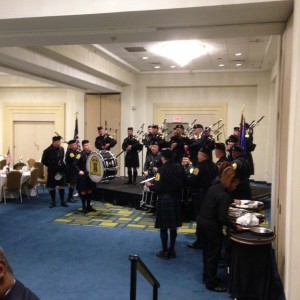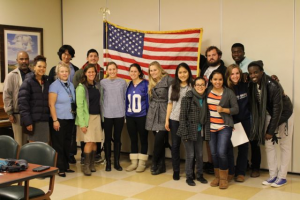On a slow Sunday morning browsing through the paper, I came across Nicholas Kristof’s column describing what he calls “our broken escalator.” He is referring to our education system, what has been for so many of us the moving stairway of social mobility. He details the ways that his own beloved high school is being slowly eviscerated by budget cuts. More than 80% of school districts across the US are going to cut their budgets this year, and three quarters of them made cuts last year. “The immediate losers are the students,” Kristof writes, “in the long run, the loser is our country.”
These thoughts echoed with what I’ve been reading lately about education programs at the very beginning of our country’s history. I am spending a good part of the summer doing research for a book about why liberal education matters. Recently I’ve been reading Thomas Jefferson, and also some of his contemporaries. The political importance of education has rarely found as powerful a proponent as Jefferson, one of whose proudest achievements was founding the University of Virginia on a model of liberal learning that is ultimately practical. His friend and political rival John Adams was also a stalwart proponent of the importance of an educated citizenry. At the dawn of the Republic Adams, too, knew that only through education could citizens ensure that their government would remain responsive to their needs. As he wrote to Jefferson: “Wherever a general knowledge and sensibility have prevailed among the people… arbitrary government and every kind of oppression have lessened and disappeared in proportion.”
Jefferson was a man of the Enlightenment, and for him this meant faith that the accumulation of knowledge would improve public and private life. His conception of “useful knowledge” was capacious — extending from an array of languages to mathematics, sciences and history. He wrote: “education generates habits of application, of order, and the love of virtue; and controls, by the force of habit, any innate obliquities in our moral organization.” The experience of undergraduates, as we all know, doesn’t at all points stimulate the habits of moral organization that the author of the Declaration of Independence had in mind. But don’t we still hope that our students acquire a love of virtue, even as they discover through hard work and sociability just what “love” and “virtue” might mean?
Of course, we have grown accustomed to criticizing problematic aspects of the Enlightenment worldview of our nation’s founders. Jefferson’s hypocrisy is legendary; his insight into structures of oppression didn’t disturb his own personal tyrannies. If our third president understood that education was inexorably linked to the possibility of freedom, his racism and sexism led him to think that women, Africans or native peoples should not enjoy that possibility.
But this summer, as I listen to the partisan haggling over the debt ceiling in Washington while the epidemic of unemployment rages on, and as I hear about school districts and university systems across the country slashing budgets and cutting back on educational programs, I read Jefferson with renewed energy and engagement. As representatives in 2011 labor to preserve the tax advantages of multi-millionaires, I admire how Jefferson recognized that a sure way to preserve the privileges of wealth is to curtail educational opportunity for those without them. In his proposal for public education in Virginia, he advocated a system for discovering youngsters with talent who would benefit from scholarships so that they could pursue their studies and serve the public at the highest level. His proposed that “Worth and genius would thus have been sought out from every condition of life, and completely prepared by education for defeating the competition of wealth and birth for public trusts.” In our own time, with school districts shortening their academic calendars to save money and universities struggling to replace financial aid support once provided by government, we are undermining the hope for change and improvement that is so essential to both learning and democracy. What will become of this nation if it turns its back on the promise of education as a vehicle for social and economic mobility?
At many of the highly selective universities that have the benefit of alumni support and endowment funds, we aggressively look for “worth and genius” in all areas of the country so as to create a diverse cohort of students who will stimulate learning for and from one another. Through programs like QuestBridge or Posse Posse, and with many community-based organizations as partners, we find young men and women who can thrive in and contribute to our campus communities. We do this not out of some imagined commitment to “political correctness,” as critics of higher-ed like to complain, but so that every student (rich or poor, private, public or home-schooled) has the opportunity to expand his or her horizons. And we do this, to paraphrase Jefferson, because education should be the keystone of the arch of our nation.
As the morning wore on, I left the newspaper in the kitchen and headed out to our town’s local Sunday softball game. It’s a great community event, with kids, parents and grandparents joining in our version of the American pastime. Waiting our turn at bat, two neighbors talked with me about how the local towns had balanced their budgets this year. Guess what had to be cut in order to balance the books? Education turned out to be the easiest target. My neighbors shook their heads in sadness because, as they said, the towns balanced the books at the expense of the future. Students lose now; in the long run our region will suffer.
As we wrestle with notions of “shared sacrifice” and “living within our means,” let us not ignore our responsibility to invest in the future by supporting education. We must not allow our representatives to protect tax breaks for the most advantaged while ignoring our responsibility to give the next generation the education they need. Only education will allow the youngsters on that baseball diamond and at others across the country to protect their freedoms while competing in the world. Only by supporting their right to learn, will we have the chance to strengthen our country’s economic, political and cultural future. As Jefferson said: “Preach, my dear Sir, a crusade against ignorance; establish and improve the law for educating the common people.” “No other sure foundation can be devised for the preservation of freedom and happiness.”
Cross-posted with Huffingtonpost.com






![photo[8]](https://roth.blogs.wesleyan.edu/files/2014/01/photo8-300x224.jpg)
![photo[9]](https://roth.blogs.wesleyan.edu/files/2014/01/photo9-300x224.jpg)